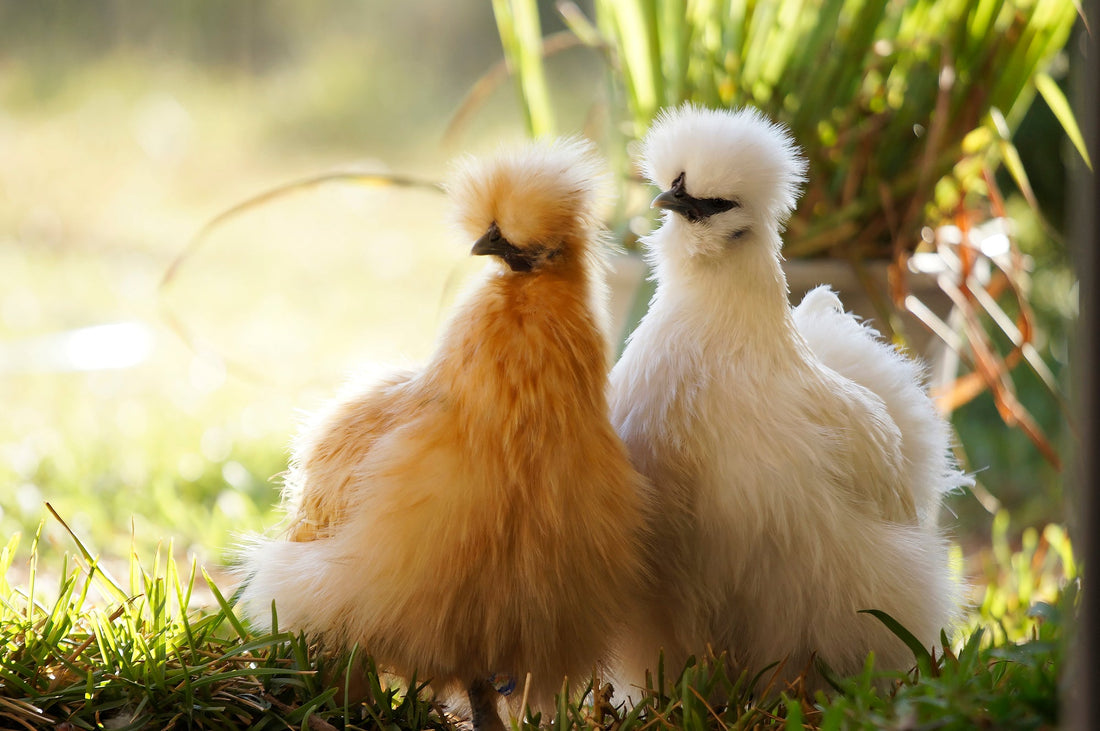Silkie chickens are a unique breed of chicken that has become increasingly popular among backyard chicken enthusiasts. With their fluffy, soft feathers and sweet personalities, these birds are a joy to raise and care for. In this blog, we'll take a closer look at what makes Silkie chickens so special, their history, characteristics, care requirements, and more.
What are Silkie Chickens?

Silkie chickens are a small breed of chicken with a distinct appearance. They are known for their soft, fluffy feathers, which have a silky texture, hence their name. These birds have a gentle, friendly personality and are often kept as pets or ornamental birds rather than for meat or egg production.
Silkie chickens are believed to have originated in China, where they were valued for their unique appearance and medicinal properties. They were later brought to Europe by traders and became popular among the aristocracy. Today, Silkie chickens can be found all over the world, and they are a popular choice for backyard chicken enthusiasts.
Characteristics of Silkie Chickens
Silkie chickens are known for their unique appearance and friendly personalities. Here are some of their distinguishing characteristics:
Feathers: Silkie chickens have fluffy, soft feathers that give them a distinctive appearance. Their feathers lack the barbicels that hold the feathers together, giving them a "fluffy" look.
Size: Silkie chickens are a small breed, weighing only around 2-3 pounds when fully grown.
Color: Silkie chickens come in a variety of colors, including white, black, blue, gray, buff, and partridge. They also have blue skin and dark flesh, which sets them apart from other chicken breeds.
Temperament: Silkie chickens are known for their gentle, friendly personalities. They are great with children and make excellent pets.
Egg Laying: Silkie chickens are not known for their egg-laying abilities. They typically lay around 100-120 small, cream-colored eggs per year, although some may lay more or less.
Care Requirements for Silkie Chickens
Silkie chickens are relatively easy to care for, but they do have some specific requirements. Here's what you need to know to keep your Silkie chickens happy and healthy:
Housing: Silkie chickens need a secure coop to protect them from predators and the elements. The coop should be dry, draft-free, and well-ventilated, with plenty of roosting space and nesting boxes.
Feeding: Silkie chickens should be fed a high-quality, balanced diet that is appropriate for their age and stage of life. They should have access to fresh water at all times, and their feed should be supplemented with treats like fruits, vegetables, and mealworms.
Grooming: Silkie chickens need regular grooming to keep their fluffy feathers clean and healthy. They should be dust-bathed regularly, and their feathers may need to be trimmed to prevent matting or other health issues.
Health: Silkie chickens are generally healthy birds, but they can be prone to certain health issues, such as respiratory infections and parasites. It's important to monitor your birds for any signs of illness and to provide regular veterinary care as needed.
Breeding Silkie Chickens
Breeding Silkie chickens can be a fun and rewarding experience, but it does require some knowledge and preparation. Here are some tips for breeding Silkie chickens:
Selecting Breeding Stock: When breeding Silkie chickens, it's important to select healthy, genetically diverse birds with good temperaments and physical characteristics. You should also avoid breeding birds that are closely related to prevent inbreeding.
Breeding: Silkie chickens are typically bred through natural mating, although artificial insemination may also be used. It's important to provide a comfortable, safe environment for the birds to mate, and to monitor the hhatching process closely to ensure the chicks are healthy and strong.
Incubation: Silkie chicken eggs take around 21 days to hatch. They can be incubated using a variety of methods, including using a broody hen or an incubator. It's important to monitor the temperature and humidity closely during the incubation process to ensure a successful hatch.
Raising Chicks: Silkie chicken chicks require special care in their early weeks of life. They should be kept in a warm, dry brooder with plenty of space to move around. They should be fed a high-quality chick starter feed and provided with clean water at all times. It's important to monitor the chicks for any signs of illness and to provide veterinary care as needed.
Silkie chickens are a unique and charming breed of chicken that are becoming increasingly popular among backyard chicken enthusiasts. With their soft, fluffy feathers, gentle personalities, and distinctive appearance, these birds are a joy to raise and care for. By following the proper care requirements and breeding techniques, you can enjoy the many benefits of owning Silkie chickens, from their beauty to their companionship.

